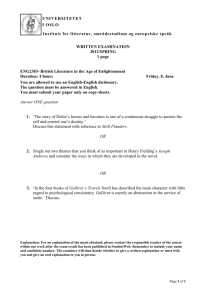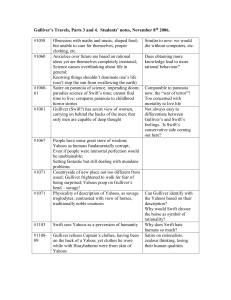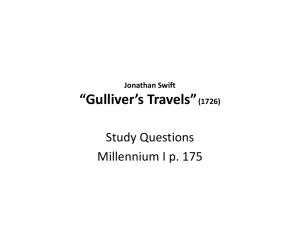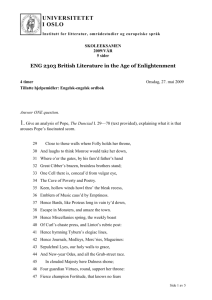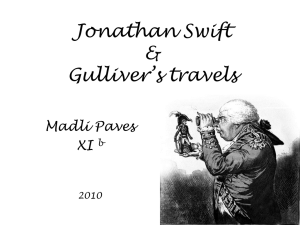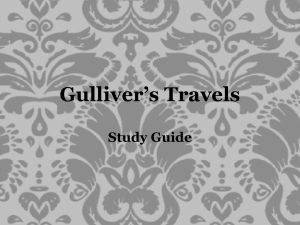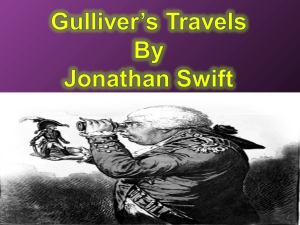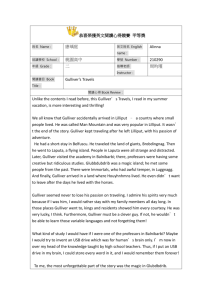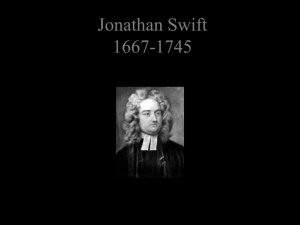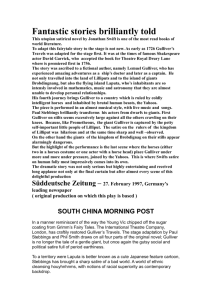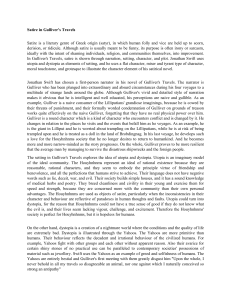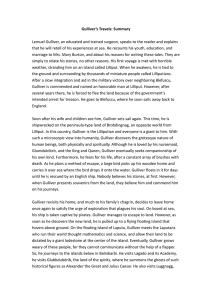Beloved Horses, Hateful Men
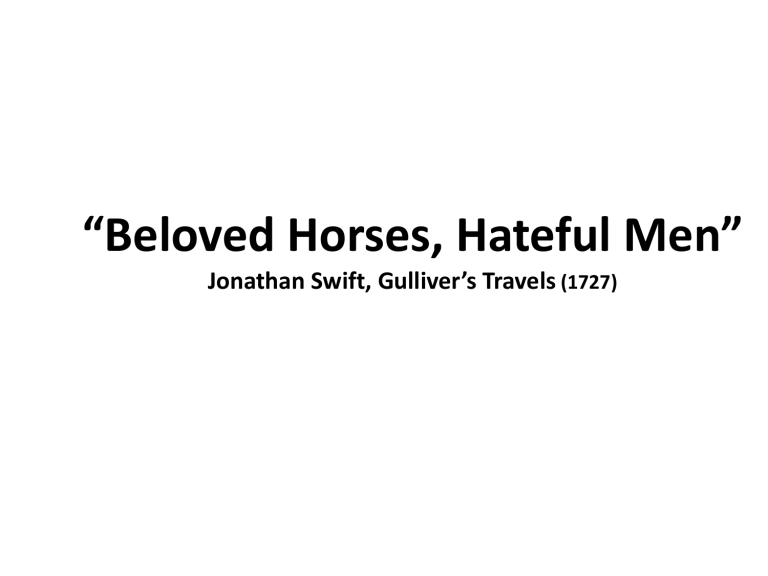
“Beloved Horses, Hateful Men”
Jonathan Swift, Gulliver’s Travels
(1727)
LANGUAGE THROUGH LITERATURE
1. Consider the first two paragraphs: a.
Highlight the comparatives in yellow.
– Comparatives: prouder (l.4), sooner (l. 10), more civilized (ll. 16-17), more qualified (l.17), better (l.22) b.
Now highlight the superlatives in red. The first ones have been done for you.
– Superlatives: the greatest (l.5), the wisest (l.5), the highest (l.8), the least (l.30).
2. Now complete the following chart by adding the missing forms and the corresponding nouns.
Adjectives Comparative Superlative Noun
0 proud
1.
great prouder greater the proudest the greatest pride greatness
2.
wise
3.
high wiser higher
4.
civilized more civilized
5.
qualified more qualified the wisest the highest the most civilized the most qualified wisdom height civilization qualification
6.
little less
3.
Consider the whole passage.
the least little a.
Highlight the adverbs of manner in blue. The first one has already been done for you.
– freely (ll. 1, 33); really (l. 15); tolerably (l.50);
LANGUAGE THROUGH LITERATURE
4. Write the adverbs down in the chart and then complete it by adding the adjectives they are formed from and the corresponding nouns.
4. Adverb Adjective Noun freely really tolerably free real tolerable freedom reality tolerance
5. Find the equivalent expression to the following ones in the text: a.
gradually “by degrees” (l.10); b. When I had the chance to c.
Because of that
“When I happened to” (l. 20)
“on that account” (l. 30) d. My wife hugged me “my wife took me in her arms” (l. 37) e. Having not been accustomed to “having not been used to” (l.38) f.
Much less could I bear them to “much less could I suffer them to” (l.43)
GUIDED ANALYSIS
1. Read paragraph 1
Gulliver’s admiration and respect for the Houyhnhnms is stated clearly: explain in your own
words and quote.
• The Houyhnhnms are described as strong, beutiful, wise, intelligent, full of virtues. They are never referred to as “animals” or “horses”, but words such as “my master” (l.2), “his friends”
(l. 3), “inhabitants” (l.6), and “amiable persons” (l. 7) are used instead. His admiration for them has made Gulliver even learn to behave like them: “I fell to imitate their gait and gesture” (l. 25), “in speaking I am apt to fall into the voice and manner of the Houyhnhnms “
(ll.28-29).
2. Read paragraph 2 a. Gulliver’s disgust at the Yahoos comes to the surface: how are they described?
• The Yahoos, who clearly stand for men (ll. 13-20), are described as inferior to the
Houyhnhnms , full of vices and incapable of reason (ll.17-18). They are clearly identified as
“animals”.
b. Are men much better than the Yahoos whom they are compared to?
• No, the only difference is that men have “the gift of speech” (l. 17), but this does not make them any better. Moreover, they use reason to multiply their vices. (l.18).
c.
Where Gulliver’s rejection of himself and of his own race best expressed?
• Gulliver must acknowledge, much to his horror and disgust, that he is exactly the same, or even worse, than the loathsome Yahoos when he sees his face reflected in the water: “When
I happened to behold the reflection ... I turned away my face in horror and detestation of myself” (ll. 20-22).
GUIDED ANALYSIS
3.
Read to the end.
a. After his return home, Gulliver is described like a man slowly recovering from a serious illness. It takes him five years to resume a “normal” life. Point out the various stages of his recovery.
• At first he can’t even tolerate the sight and the touch of his wife and children, who are not allowed to eat in the same room; then he gets used to seeing them, but he still does not let them touch his food or drink from the same cup or even touch him. His disgust is clear when he refers to his wife as “that odious animal” (l. 39).
b. Can we say he really recovers?
• We cannot say Gulliver recovers, because from the last few lines we come to know that he reduces himself to living in the stable with two horses.
GUIDED SUMMARY
4. Using your answers to the questions above write a short summary of the excerpt. End with
Swift’s point of view on the nature of man. (maximum 120 words).
Gulliver prefers the company of the wise horses to that of men. He loves and respects them for their excellent qualities. When he thinks of his race, he is filled with disgust. He imitates the Houyhnhnms in his speech and way of walking. Back home, his family welcome him but he cannot bear the sight of them. He prefers talking to his horses, which are his best friends, to staying with his relatives.
Swift shows a deep pessimism about the nature of man that pairs him to Hobbe’s scepticism and is very far from Rousseau’s conception of man as intrinsically good. From the excerpt we can deduce that for Swift evil is an intrinsic part of human nature. (118 words).
